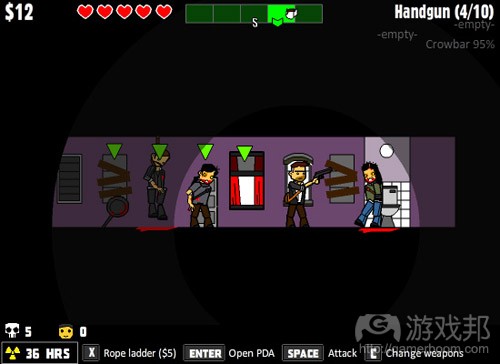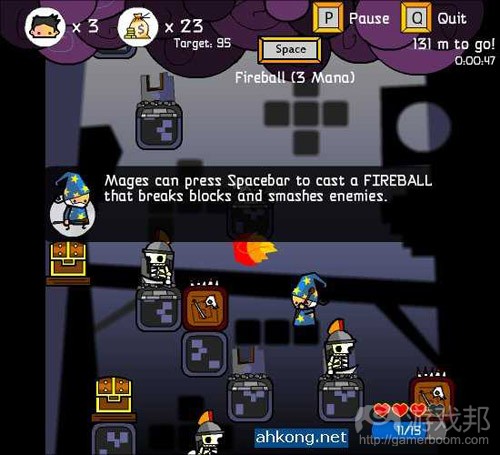开发者分享从Flash游戏转向桌面游戏的历程
作者:YC Sim
几年前,我做出了一个重大决定,即离开一家大型油气公司舒适且高薪的工程师职位,而转行作为一名游戏开发者。在我的国家,马来西亚,这是一个非常奇怪的职业选择,这里的许多家长都认为工程学与医药学才是最有前途的工作。
浏览器游戏领域!
当然,我并不是随便就做出如此谋生的决定,在离开工程师的工作前我便已经利用业余时间制作了一些赞助游戏。放弃了睡眠时间与周末的休息时间,我一直努力工作着,不断学习游戏开发技能,在Gamasutra上阅读各种文章,观看更大的开发商们如何从Flash游戏市场上赚取利益。
首先,让我先快速总结我对于Flash游戏市场的理解以及那些将此作为职业选择的游戏开发者们在这里的位置。
浏览器游戏所具有的最大优势便是较大的触及范围:一款成功的游戏能够轻松地到达数千万玩家面前,因为每台计算机都有浏览器,而游戏的设计都是基于快速加载以及较短的游戏过程。大多数流量都是来自大型Flash游戏门户网站,如Kongregate,Newgrounds和Armorgames等等。这些门户网站提供了大量的用户并支付了巨大的带宽成本,开发者只需要提供内容便能为门户网站生成流量。对于许多Flash游戏开发者来说主要的收入是源自门户网站的赞助,即包括logo以及赞助者的链接等内容的费用(游戏邦注:不同门户网站以及不同游戏的费用是不同的)。随着游戏在广阔的网络上不断扩展着,巨大的玩家数量以及概率曲线都预示着他们中的有些人将不可避免地点击门户网站,从而带给游戏一定的价值。我们可以在Gamasutra上找到大多数受欢迎的游戏的赞助数据,暂时维持开发者的发展通常是有利可图的。
前些年的我
我曾在PC Gamer上阅读了一篇有关Kongregate的存在,即追溯到它在2007年创建时候的文章,并在那时候决定尝试创造一些非赞助游戏。但最终它们都很糟糕,并只为我赚到了少量的收益(我的第一款游戏自上传后7年内只获得了30美元不到的收益!),但我还是很高兴Kongregate能够带给我所需要的最初曝光。你总是会对自己的第一款游戏感到惊讶,直到你将其呈现在更广泛的用户面前时:虽然一开始我会因为收到的批评和严厉的反馈感到沮丧,但现在我意识到这都是很正常的,因为我的游戏真的很糟糕,这样的经历也帮助我能够在今后的日子里更加积极地面对各种负面反馈。
我的第一款赞助游戏是《Zombies Took My Daughter》,获得了ArcadeBomb和Vertical Drop Heroes的赞助,并通过FlashGameLicense网站获得了NinjaKiwi的赞助。我真的很感谢这些赞助者在帮助我走上现在的这条道路所提供的巨大帮助。当我收到游戏的第一笔费用时,我兴奋地告诉了父母以及女朋友(也就是我现在的妻子),不过他们都对这笔钱表示怀疑,担心我会成为某些西方骗局的牺牲品。不过现在回想起来真的觉得蛮有趣的。
《Zombies Took My Daughter》:我在2010年创造的一款程序僵尸生存游戏!
《Vertical Drop Heroes》:一款程序平台游戏,也是我的第二款赞助Flash游戏。
2010至2012年:Nerdook游戏的一年
当逐渐看清游戏的赞助付费并不是所谓的骗局时,我开始认真地将游戏创造当成自己的职业。在接下来的几年里,创造游戏成为我的兼职,即晚上和周末的时间都奉献给了游戏开发。为了节约成本,我不得不学会一切事物,包括编码,游戏设计,图像,动画,声音和音乐等等。最后我意识到音乐才能是不能假装的,所以我将其外包给Newgrounds的编曲家(而在某些时候,我的妻子也是一名有天赋的音乐师)。
有句老话这么说:“晒草要趁太阳好”,而2010至2012年不管是对于我还是Flash游戏都是发展的大好时机。我努力每两个月创造一款游戏,并且几乎每款游戏都是基于Kongregate的赞助,尽管只有一款游戏取得了巨大的成功(游戏邦注:《怪物杀手》:单在Kongregate上就吸引了410万的访问,至今在世界各地共吸引了1000万人的注意),而剩下的游戏大多都表现平平。甚至到了今天,我也不知道自己到底是如何做到它们的,除了带着想要看到每个项目完成的决心。到今天为止,我在Kongregate上共有18款基于该网站赞助的游戏,而这些游戏共吸引了2500万的访问。
我在这些年所使用的一些重要策略是:
1)保持简单:每款游戏都有一个明确的核心理念,这将快速被创造出原型并不断迭代,直至变得足够优秀并能够发行。我会尽可能抵制诱惑而避免添加更多内容到每款游戏中,专注于确保核心循环足够简单且有趣。
2)学习与适应:关于我所创造的每一款游戏,我会尽力将其当成是自己下一款游戏的学习工具,创造一个常见的函数和工具库,寻找更有效的方法去使用自己所拥有的资源。在整个过程中我学到了更好的碰撞,检测,更完善的向导,更加程序化的公式以及动画技巧等等,有时候是通过其他人的引导,有时候则是根据自己的实验。
3)创造用户基础:我不得不承认,我的市场营销技能并不突出,但我始终都会尽自己所能诚实且坦率地对待粉丝们,避免与他们展开无止尽的争论,并与他们分享我的游戏设计决策背后的基本原理。在Kongregate聊天室中我交到了许多好朋友,在自己的Facebook页面上也不断聚集了更多粉丝,同时我也会邀请一些粉丝作为我即将发行游戏的测试员。
飞跃
我是在2011年初辞掉工作,并在不久后结了婚。我的女儿出生于2012年12月31日,基于在家工作的灵活性,我决定索性做一名在家办公的家长,而我的妻子则到外面工作。
照顾小孩总是比工作重要,所以我只能在女儿有人照顾或者睡着的时候才去忙于代码编写。那时我才知道小孩子竟然有那么大的精力!几个月过去了,我的银行帐户中的金额不断减少这,我最终做出了一个重要的决定:也许是时候将自己在Flash开发中学到的应用于一些更大的挑战中。
所以我便再次开始学习,首先我在Flash上试用了Starling,然后学习了Gamemaker Studio。我决定在Gamemaker创造自己的第一款桌面游戏,因为这一平台与Flash和ActionScript非常相似。我决定再度为这次的“职业重启”拉赞助:是时候将《Vertical Drop Heroes》现代化成一款rogue平台游戏,即整合我在过去7年里所需得到的所有东西。
所以我再次努力工作,创造可行的游戏版本,为拉动下载创造一个早期的演示版本,制作了预告片,将其整合到全新的Steam Greenlight页面,并与其它独立游戏一样等待批准。
所以我才走到了今天!我仍然致力于游戏,但如今我的大多数时间是在努力说服别人进行尝试,兴奋地检查每天的投票,好奇为什么投票率正在下降,并做着每个等待Greenlight项目的独立游戏开发者能够理解的其它痴迷行为。
游戏开发职业是一种非常冒险的选择,需要面对大量的挑战及其沉浮的独特品牌。如果你正在考虑将其作为自己的职业,我便会对你说大胆地去做吧,但是你必须拥有足够开放的双眼,不断进行研究,并事先做好备份计划以应对任何糟糕的局面,同时在遭遇任何问题和沮丧时都始终保持着对于游戏的热情。
我会取得成功吗?谁知道?未来是不确定的,但是我很高兴看到自己目前所做的,对于PC游戏来说这看起来真的是很让人兴奋的一年。
(本文为游戏邦/gamerboom.com编译,拒绝任何不保留版权的转载,如需转载请联系:游戏邦)
Making the Jump: my journey from Flash games to desktop games!
by YC Sim
A few years ago, I made the huge decision to leave a comfortable, well-paying engineering job with a fairly large oil and gas firm to pursue a career as a game developer. In my country, Malaysia, that’s a pretty strange career choice, in a land where many parents consider engineering and medicine as coveted jobs for their children.
The Land of Browser Games!
I don’t make a life decision like that very lightly, of course, and I was already making sponsored games in my spare time by the time I left my job. At the cost of having very little sleep over the nights and weekends, I had been beavering away, learning game development skills on the side, reading articles from Gamasutra, watching how the bigger developers make money from the Flash gaming market.
First, a quick summary of my understanding of the Flash game market and the game developer’s place in it, for those who are considering it as a career choice.
The biggest advantage browser games have is their huge reach: a successful game can easily reach tens of millions of plays, since every computer has a browser and the games are often designed to be quickly loaded and played within a short ten minute break. Most of this traffic comes from large Flash game portals, such as Kongregate, Newgrounds and Armorgames, just to name a few. These portals provide the hosting and pay the considerable bandwidth costs, while developers provide the content and generate traffic to the portals. The main income for many Flash game developers comes from sponsorships by the portals, where a certain amount of money is paid (the actual amount varies from portal to portal, and from one game to another) in exchange for including a logo and link to the sponsors. As the game is spread far and wide throughout the expanse of the Internet, the sheer number of players and the probability curve dictates that SOME of them will inevitably click through to the portals, which gives value to the games. The sponsorship figures for the most popular games can be found on Gamasutra, and are often lucrative enough to keep the developers going for a while.
My Early Years
I read in a PC Gamer article about the existence of Kongregate back when it first started in 2007, and decided to try my luck with a few unsponsored games. They were uniformly terrible, and ended up earning a small pittance for me (a quick check reveals that my very first game has earned me less than $30 in the seven years since it was uploaded!), but I am grateful to Kongregate for giving me that initial exposure I needed. Your first game always seem amazing to you, until you put it in front of a wider audience: while I was initially a little upset over the criticisms and harsh feedback I received, I realise now that this was completely normal, my games really WERE that bad, and prepared me to deal positively with negative feedback in the years ahead.
I remember my very first sponsored games: Zombies Took My Daughter, sponsored by ArcadeBomb, and Vertical Drop Heroes, sponsored by NinjaKiwi through the FlashGameLicense site. I owe all of them my eternal gratitude for starting me on the path I am on now! When I received my first payment for the games, I told my parents and my girlfriend (now my wife), and they ALL expressed skepticism at the money, worrying that I was about to fall victim to some sort of Western hoax. It’s all a bit funny now that I look back on those days!
Zombies Took My Daughter: A procedural zombie survival game I made in 2010!
Vertical Drop Heroes: a procedural platform game, and my second sponsored Flash game
2010-2012: The Years of Nerdook Games
When it became clear that the sponsorship payments for the games were not some kind of elaborate hoax, I began my game making career in earnest. For the next few years, making games became a part-time job for me, with my nights and weekends filled with game development work. To save costs, I had to learn EVERYTHING: coding, game design, art, animation, sounds and music. In the end, I realized musical talent is not something that I was able to honestly say I have, and outsourced it to composers recruited from Newgrounds (and on a few occasions, my then-girlfriend-now-wife, who is a musical genius).
The old adage is “make hay while the sun shines”, and 2010-2012 appeared to be the golden years for both me and Flash gaming in general. I managed to make a game every 2 months or so, almost all of them sponsored by Kongregate, and while only one game was a huge success (Monster Slayers: 4.1 million views on Kongregate alone, and over 10 million worldwide to date), the rest were moderate successes. Even today, I had no idea how I really did all of it, except maybe from sheer determination to see each project finished. As of today, I have eighteen Kongregate sponsored games on their site, with a combined total of 25 million plays.
Some of the key strategies I used throughout these years were:
a) Keep it simple: Each game had a clear core concept, and this was quickly built into a prototype and iterated upon until it’s good enough to be published. As far as possible, I resisted the temptations to add too many things to each game, and focused on making that core loop simple and fun.
b) Learn and adapt: With every game I made, I did my best to use each one as a learning tool for the next game, building a common library of functions and tools, and researching better and more efficient ways to use the resources I have. Better collision detections, improved pathfinding, better procedural algorithms, and animation tricks were all things that I learned along the way, sometimes from other people, and sometimes through my own experimentation.
c) Build the fanbase: I have to admit, my marketing skills are not as good as they could be, but I always did my best to engage my fans honestly and openly, doing my best not to be dragged into countless arguments with them, and sharing the rationale behind some of my game design decisions. I made a lot of good friends on the Kongregate chatrooms, gathered all my fans slowly but surely on my own Facebook page, and recruited some of them as beta testers for upcoming games.
Making the Jump
I left my job in early 2011, and on Christmas Eve that year, I got married. My daughter was born on 31st December 2012, and with the flexibility I have working from home, I decided to take on extra duties as a stay at home parent while the wife goes to work.
Taking care of a child always takes precedent over my work, so I am only able to work on my code while someone else is taking care of her, or when she finally falls asleep. It’s amazing how much energy a little child has! As the months went on and my bank account dwindled from the reduced productivity, I made a major decision: maybe it’s time to leverage the things I’ve learned from Flash development into bigger things.
And so I started learning again, first experimenting with Starling on Flash, then learning Gamemaker Studio. I decided to make my very first desktop game in Gamemaker, since it’s similar enough to Flash and Actionscript. I decided to return to my roots for this “career reboot” of sorts: it’s time to modernise Vertical Drop Heroes into a roguelite platformer that incorporates everything I’ve learned in the last seven years!
And so I beavered away again, making a playable version of the game, built an early alpha demo for download, crafted a trailer, and popped it into a brand new Steam Greenlight page, where it now languishes, awaiting the approving votes of the masses, like a thousand other indie games.
So here I am today! I am still working on the game, but most of my time is now spent trying to convince others to give it a try, checking feverishly at the daily votes, wondering why the vote ratio is dropping, and all the other borderline obsessive behaviours that every independent game developer with a pending Greenlight project totally understands.
This game development career thing has been a crazy adventure and a wild ride, with plenty of challenges and its own unique brand of ups and downs. But if you’re considering it as a career, I’d say go for it, but do it with your eyes wide open, do your research, have a backup plan if things go south, and always keep that passion for games burning through the dark hours and the endless problems you will encounter along the way.
Will I succeed? Who knows? The future is as uncertain as ever, but I’m happy with what I’ve done so far, and it looks like an exciting year ahead for PC gaming in general. It’s always been strange career choice, but I wouldn’t have traded it for the world!(source:gamasutra)
上一篇:阐述游戏设计的自我反映及重要元素
下一篇:复古电子游戏的7个非必要难度功能









































 闽公网安备35020302001549号
闽公网安备35020302001549号